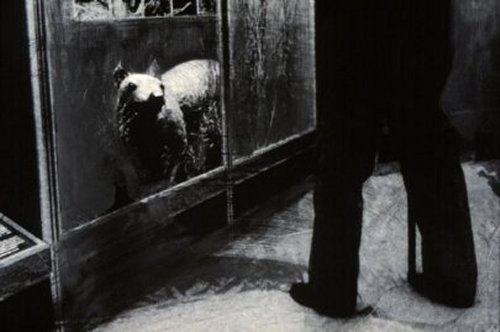THE WORK OF GENERATIONS:
TRANSITION FROM GENOCIDAL TO DIALOGIC MENTALITY
By Elaine Schwager

Thylacinus cynocephalus - "The pouched dog with the wolf's head".
Welcome to the third issue of Thylazine; The Australian Journal of Arts, Ethics & Literature.
"If only it were all so simple! If only there were evil people somewhere insidiously committing evil deeds, and it were necessary only to separate them from the rest of us and destroy them. But the line dividing good and evil cuts through the heart of every human being. And who is willing to destroy a piece of his own heart?" Alexander Solzhenitsyn
This quote speaks of a mentality that has dominated our minds and thinking for millennia. One in which a culture or leader privilege an ideology, theory, or value, at the expense of diminishing an other and attempts through power, manipulation, fear and terror to create rationales, scientific evidence, and moral principles to convince a community, country or population that the adherence to these precepts makes them superior and justifies the diminishment or elimination of the other. The most extreme outcome of this mode of thinking is the ongoing genocides, the turning of humans against their own species.
Genocidal mentality has been a pervasive mentality of our species, motivating our actions, not just in war, but in how we have raised children and how we relate to each other in intimate relationships. This mentality, while not necessarily destroying our lives physically, destroys aspects of self that could contain the potential to exist within ourselves and with each other in a more hopeful, creative and productive way.
As Einstein observed: "The splitting of the atom has changed everything except the way we think. ... There's been a quantum leap technologically in our age, but unless there's another quantum leap in human relations, unless we learn to live in a new way towards one another, there will be a catastrophe".
Genocidal mentality holds in place certain assumptions we have taken for granted to be true. For example - man has basic aggressive instincts, a dualistic state of mind (constantly operating to judge good and evil, true and false on the basis of certain truths established by religions, institutions, theory, culture), a hierarchical, power oriented organization of reality, where "reality" or "truth" is most often externally defined, demanding compliance of those in its jurisdiction,) Continuity with these institutions and groups and survival within them most often demands compliance and acceptance of the reality that is established by them. Development of one's creative, transcendent capacities, (locating power and authority within oneself through the integration and transcendence of dualities and autonomous and creative thinking) is often neglected out of fear this state of mind would challenge existing power and the continuity of the group as it is presently organized..
Integration of dualities is a creative process that leads to the transcendence of reactive emotions, based on internalized ideologies, loyalties and defenses. Seemingly contradictory feelings can exist within oneself. In forgiveness one learns to love those who may have hurt one the most; in compassion one may feel the anger and pain of being wounded by another's projected trauma, while simultaneously feeling sympathy for the other's trauma and pain.
The repression or lack of development of these capacities consciously or unconsciously leads to a sense of depression, hopelessness, alienation, and meaninglessness. Such capacities not made conscious, may generate 'wars' within the self, create divided, and fragmented selves in order to maintain both one's safety and status within the external hierarchical system, and some alive connection to the inner creative, transcendent aspects of the self that may contain the seeds of the "quantum leap in human relations" that Einstein believed contained the hope of avoiding catastrophe for humankind. Genocidal mentality, once set in motion, contains mechanisms which are self-perpetuating and therefore extremely difficult to change unless consciously reflected on and transcended.
This difficulty, along with validation in our culture of its "reasonableness" or "normality" often makes the task of changing to a capability of true dialogue, a process spanning several generations. It is the 'normality' or 'obviousness' of what we believe as well as the fact of how easily we accept our normality as fact without reflection, that is a central obstacle to change. The obvious in Hitler's Germany was that Jews were inferior and a contamination of the Aryan race, the obvious to European settlers coming to America was that "Indians" were savages and interfered with their settlement of this country, the obvious to Bin Laden is that Americans are infidels and possessed by the evil of greed and material accumulation, the obvious to Bush is that there is an axis of evil that threatens the "good' people of the western world and should be eliminated.
The obvious is literally that which stands in one's way, in front of or over oneself. One has to begin by recognizing that it exists for oneself. "..Someone whose mind is imprisoned in the metaphor cannot see it as a metaphor. It is just obvious. Laing (1968) "The Obvious" (p.13-14, 17-18). Without reflection, the capacity to make a symbolic, metaphoric reality out of the reality we believe to be absolute, we mistake what is obvious for "reality". We mistake our delusions for perceptions and assume that others who do not hold to what we see as obvious need to be converted, persuaded, convinced, hated, held in contempt or thought of as ignorant or fools.
If we don't see the context of our life as a metaphor of a particular psychological/social configuration to be deciphered and moved beyond, that is, creatively transformed, we are trapped in that metaphor, a victim of the past determining our existence, rather than existing to determine the future. To be trapped in a metaphor created by the past is a non-dialogic existence.
To engage in our existence dialogically, the metaphoric nature of our existence, mentally, interpersonally and socially needs to be creatively and symbolically transformed in ways that expand our relation to all three, that is, makes room for more aspects of the other in oneself, allows for more aspects of the self to be part of the other, and more of oneself in the world, and the world in oneself. A non-dialogic or genocidal mentality would exterminate aspects of the other that do not fit in with the self's idea of acceptable or 'good', get the other to exterminate aspects of the self to comply to one's own idea of acceptable or good, or aspects of the self are exterminated in order to comply to the other so as not to be in danger of extermination by the other. When one is in the straight jacket of believing the metaphor to be reality, and not reflecting on the metaphor, one can only exist in relation to the other with violence, aggressively trying to make the other an extension or part of the metaphor or defending one's right to be that metaphor. This state is a state of delusion. In trying to preserve our metaphors, fix them in reality, we destroy people, who are more than a projected metaphor. We kill masses of people, as we did in Vietnam, because we are afraid that somewhere in the minds of the millions we slaughtered is the wrong metaphor or the wrong ideology. What is destroyed by a genocidal mentality is also the potential to partake in a dialogic process that would create a between that moves us beyond the check-mate of people fighting to the death to defend the absolute truth of their metaphors.
Reflection and doubt mobilize the symbolic process which allows one to differentiate from the symbiotic relationships of the past and present which holds the fixed images in place. Our symbiotic relationships with people from the past, and present people embodying the past, are often ridden with fears and terrors that are the residual of traumatic and genocidal behaviors and experiences, making change and the transition from one to the other painful and difficult. This is why the transition from a genocidal to dialogic mentality often involves the work of generations.
Elaine Schwager (Guest Editorial)
Thylazine thanks the following people for their generosity: Joyce Parkes ($30.00), John Kinsella ($100.00) towards Thylazine No.3.
A special thanks to the contributors; Environment Australia and the aboriginal traditional land custodians of Kakadu National Park, Northern Territory, Australia, Tony Birch, MML Bliss, Pam Brown, Colleen Burke, Grant Caldwell, Alison Croggon, Melita Dahl, Brett Dionysius, Kim Downs, Liz Hall-Downs, Philip Hammial, Coral Hull, D J Huppatz, Subhash Jaireth, Jill Jones, Jayne Fenton Keane, John Kinsella, Jan Owen, Trevor Poulton, Elaine Schwager, Stephen Oliver, Judith Rodriguez, Tracy Ryan, Jennifer Strauss, Peter Skzynecki, Tim Thorne, John Tranter, Ouyang Yu, Komninos Zervos and the many photographers and the many artists and photographers whose work is included in this issue.
And others; Stephen Booth, C. Campbell from The Thylacine Museum, Iain Fraser, Nola Fraser, Patty Mark and the Action Animal Rescue Team, Monika Biernacki (Monika's Doggy Rescue), Kindi and Binda who renew my dreams on a daily basis, Jenni Mitchell, "Shamrock" and "Judy" the graceful donkeys at The Good Samaritan Donkey Sanctuary, Pamela Sidney, the eleven black angus cows from Rylstone: Molly, Emma, Caliban, Millie, Amanda, Monica, Stevie, Maggie, Ruby, Rachel and Faith, the National Library of Australia and lastly to Josh, Marla and The Envirolink Network (Pennsylvannia, USA) without whose support and assistance this website would not be possible.
About the Writer Elaine Schwager

|
Elaine Schwager is a published poet, practicing psychoanalyst and screenwriter, living in New York City in the USA. She has had poems in Rattapallax, Literal Latte, Writ (Toronto), The World (St. Mark's Poetry Project), Armadillo, Promethean, Gaia and many other literary publications. Her poems have also been in two anthologies: It Is the Poem Singing in Your Eyes (Harper and Row) and City in All Directions (Macmillan). She has been awarded residencies at The MacDowell Colony, The Woodstock Guild and The Vermont Studio Center. Her first book of poems I Want Your Chair is published by Rattapallax Press. Elaine is making documentaries on the reconciliation between the descendants of the holocaust and working on her second book. |
[Above] Photo of Elaine Schwager by photographer unknown, year unknown.
I Next I
Back I
Exit I
Thylazine No.3 (March, 2001) |



